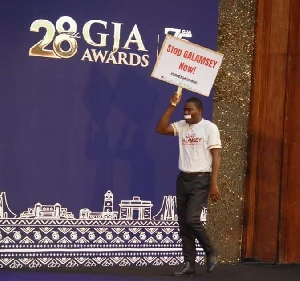On September 28, 2024, the 28th Ghana Journalists Association (GJA) Media Awards took place at the Accra International Conference Center.
The master of ceremonies announced,"...And this evening, we would like to congratulate the Best News Reporter award in the Television category, Fred Duhoe of Channel One Tv previously known as Citi TV"
With his lips sealed with a strip of tape, Duhoe walked confidently to the stage to receive the honor for his impactful story, "Resilient North Tongu Women Take Care of Their Families Despite Devastation from Dam Spillage."
Duhoe's white T-shirt with the inscription "I Stand Against Galamsey" was tucked into his trousers, and in his right hand, he held a placard with a white background and bold red letters demanding "Stop Galamsey Now." Clearly, Duhoe staged a powerful solo silent protest against one of the most pressing and headline-grabbing issues in recent times, hereinafter, Galamsey- illegal mining. It is an activity plaguing Ghana with its devastating environmental and social consequences. The latest best TV News reporter's "silent-is-a-language" appearance on the stage captured everyone's attention.
I must say that this solo protest sends powerful symbolical messages. This corroborates the reason when we say "silence speaks volume". Taking a critical inventory of Duhoe's action:
𝗪𝗵𝗶𝘁𝗲 𝗧-𝘀𝗵𝗶𝗿𝘁
An attire can serve as an unspoken act of dissent, a visual way to display the values with which you align (or don’t), as well as an expression of solidarity with a movement at large (Grechko, 2020). According to the Head of Exhibitions at the Fashion and Textile Museum in London, Dennis Nothdruft, "the T-shirt is a really basic way of telling the world who and what you are.”
I believe that Fred Duhoe's decision to wear a white T-shirt with "I Stand Against Galamsey" inscribed on it to the 28th Ghana Journalists Association Media Awards was a deliberate and powerful. By doing so, the Solo protester drew parallel with the 1917 Silent Protest Parade organized by the National Association for the Advancement of Colored People (NACCP). This was where nearly 10,000 Black participants wore white to represent innocence and peacefully protest racial violence.
The color white has historically been used in protests to convey unity, innocence, and solidarity. In the early 1900s, women suffragists wore white to challenge traditional notions of chastity and conservatism. Similarly, Duhoe's white T-shirt served as a visual representation of his non-violent stance against Galamsey, an illegal mining activity devastating Ghana's environment and communities.
𝗧𝘂𝗰𝗸𝗲𝗱-𝗜𝗻 𝗧-𝗦𝗵𝗶𝗿𝘁
Notably, Duhoe's T-shirt was tucked into his trousers. This conveys gentility, respect and professionalism. This subtle detail brought out the gravity of the galamsey issue and his commitment to using peaceful, professional and gentle demonstration for change.
𝗦𝗲𝗮𝗹𝗲𝗱 𝗟𝗶𝗽𝘀
It is interesting to see how the silent protest tactic is being used in different contexts. In Nigeria specifically, Abuja, members of the Redeemed Christian Church of God held a silent protest against the killing of Christians in Nigeria. They used sellotape to seal their lips. This demonstration was in response to the murder of Deborah Samuel who was accused of blasphemy. Protesters carried placards with messages like "Stop the killing! God is watching" and "No killings in the name of religion."
This method of silent protest is in line with Fred Duhoe's latest action against illegal mining in Ghana. Both cases demonstrate the power of nonverbal communication in drawing attention to important issues. Duhoe's bold statement at the 28th Ghana Journalists Association Media Awards was a powerful call to action against Ghana's devastating illegal mining issue. By sealing his lips with a strip of tape, the journalist brought attention to the risks faced by those who speak out against Galamsey, including arrests and summonses. This is not an isolated incident; many have been arrested for protesting Galamsey.
𝗥𝗶𝗴𝗵𝘁-𝗛𝗮𝗻𝗱𝗲𝗱 𝗣𝗹𝗮𝗰𝗮𝗿𝗱 𝗛𝗼𝗹𝗱
In the Ghanaian cultural context, using one's right hand for communication conveys respect and good nurturing. The latest TV News reporter, Fred Duhoe, holding the placard (literally, his mouth) in his right hand, symbolically expressed respect in his silent protest against Galamsey. The bold red letters on the white placard, "Stop Galamsey Now," conveyed a sense of urgency and discontent. This visual representation matched the Akan old proverb "Yɛwɔ ntosuo kɔkɔɔ wɔ obiara anum nanso yɛgyae te fitaa" (We have red-hot feelings, but we spit white truths).
Duhoe's protest should have been the media's focus for a week if we truly want to stop galamsey. But surprisingly, the media, the people's voice, has been muted – a clear case of quid pro quo; you scratch my back, I scratch yours.
Countrymen, let us not allow illegal mining to exacerbate its harmful effects on Ghana, lest we find ourselves living the harsh truth of Bob Marley's words: 'In the abundance of water, the fool is thirsty.
By Adjei Dickens Ofori Asare
Communication Head, Center for Public Discourse Analysis & MIL Advocate
dickensadjei20@gmail.com
Opinions of Friday, 4 October 2024
Columnist: Adjei Dickens Ofori Asare



















